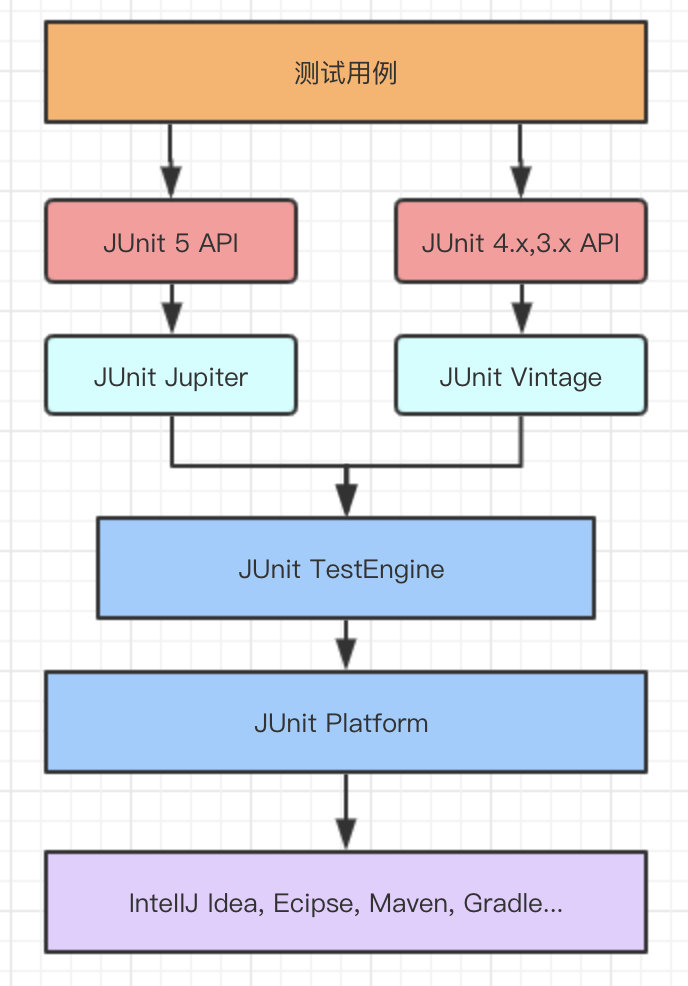1. JUnit5 组成
JUnit 5 =
JUnit Platform
+
JUnit Jupiter
+
JUnit Vintage
JUnit Platform:为在JVM上启动测试框架提供基础。它还定义了TestEngine API, 用来开发在平台上运行的测试框架。此外,平台提供了一个控制台启动器,用于从命令行启动平台,并为Gradle和Maven提供构建插件以及基于 JUnit 4的Runner,用于在平台上运行任意 TestEngine 。
JUnit Jupiter是在JUnit 5中编写测试和扩展的新型编程模型和扩展模型的组合.Jupiter子项目提供 了 TestEngine ,用于在平台上运行基于Jupiter的测试。
JUnit Vintage提供 TestEngine ,用于在平台上运行基于JUnit 3和JUnit 4的测试。

2. 注解
| 注解 | 描述 |
|---|---|
|
|
表示该方法是测试方法。与 JUnit4 的 @Test 注解不同的是,这个注解没有声明任何属性。 |
|
|
|
|
|
|
|
|
|
|
|
|
|
|
用于配置带注解测试类的测试方法执行顺序;类似于JUnit 4的@FixMethodOrder。 |
|
|
用于为带注解的测试类配置测试实例生命周期。 |
|
|
声明测试类或测试方法的自定义名称。 |
|
|
声明测试类的自定义名称生成器。 |
|
|
表示被注解的方法应在当前类的每个 @Test , @RepeatedTest , @ParameterizedTest 或 @TestFactory 方法之前执行 ; 类似于 JUnit 4 的 @Before 。 |
|
|
表示被注解的方法应在当前类的每个 @Test , @RepeatedTest , @ParameterizedTest 或 @TestFactory 方法之后执行 ; 类似于 JUnit 4 的 @After 。 |
|
|
表示被注解的方法应该在当前类的所有 @Test , @RepeatedTest , @ParameterizedTest 和 @TestFactory 方法之前执行 ; 类似于 JUnit 4 的 @BeforeClass 。必须是静态方法。 |
|
|
表示被注解的方法应该在当前类的所有 @Test , @RepeatedTest , @ParameterizedTest 和 @TestFactory 方法之后执行 ; 类似于 JUnit 4 的 @AfterClass 。必须是静态方法。 |
|
|
|
|
|
在类或方法级别声明标签,用于过滤测试 ; 类似于 TestNG 中的 test group 或 JUnit 4中的 Categories 。这个注释可以在类级别上继承,但不能在方法级别上继承。 |
|
|
用于禁用测试类或测试方法 ; 类似于 JUnit4 的 @Ignore 。 |
|
|
如果执行超过给定的时间,则使 test, test factory, test template, or lifecycle method 失败。 |
|
|
用于注册自定义 扩展 |
|
|
用于通过字段以编程方式注册扩展名。 |
|
|
用于通过 lifecycle method或test method中的字段注入或参数注入来提供临时目录。 |
【注】
方法被
@Test
,
@TestTemplate
,
@RepeatedTest
,
@BeforeAll
,
@AfterAll
,
@BeforeEach
,
或
@AfterEach 注解了都不能有返回值,都应该是
public void XXX(args… ){ … }
这样的方法 。
3. 示例
maven 依赖
<dependency>
<groupId>org.junit.platform</groupId>
<artifactId>junit-platform-launcher</artifactId>
<version>1.7.0</version>
<scope>test</scope>
</dependency>
<dependency>
<groupId>org.junit.jupiter</groupId>
<artifactId>junit-jupiter-engine</artifactId>
<version>5.7.0</version>
<scope>test</scope>
</dependency>
<dependency>
<groupId>org.junit.vintage</groupId>
<artifactId>junit-vintage-engine</artifactId>
<version>5.7.0</version>
<scope>test</scope>
</dependency> @Test
public void testCase(){
Assertions.assertEquals(2,1+1);
}